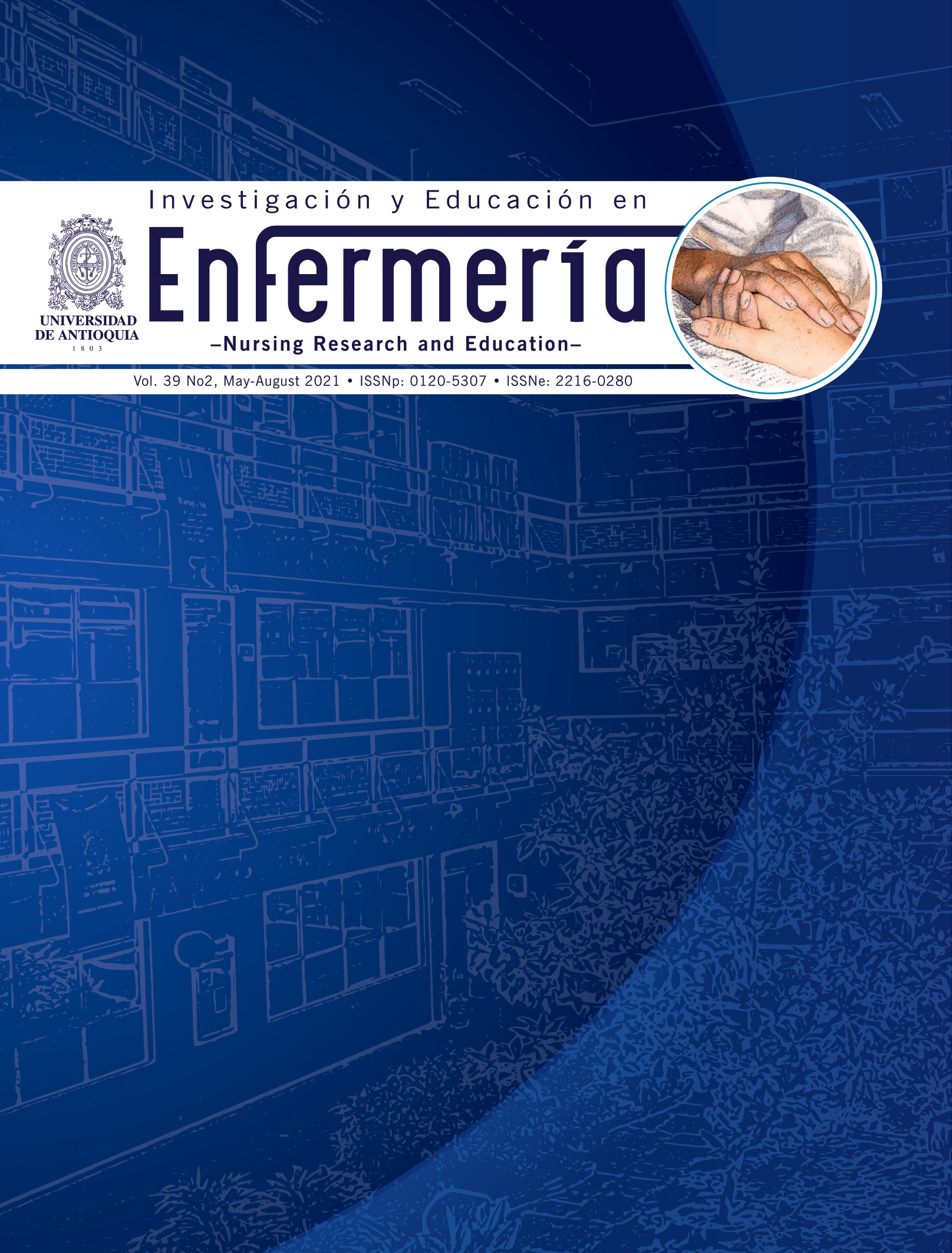Grieves and struggles of family caregivers providing care for bedridden elderly patients affected by chronic degenerative diseases
DOI:
https://doi.org/10.17533/udea.iee.v39n2e09Keywords:
caregivers, home nursing, aged, family health, qualitative researchAbstract
Objective. To understand grieves and struggles of family caregivers providing care for bedridden elderly patients affected by chronic degenerative diseases.
Methods. This cross-sectional study was developed following the guidelines of the clinical-qualitative method. The sample was composed of 10 female family caregivers of bedridden elderly patients affected by chronic degenerative diseases in a city in the interior of Minas Gerais, Brazil. The sample size was determined by data saturation. The instruments used included semi-structured interviews and a field diary. The audio-recorded interviews were transcribed verbatim and submitted to content analysis. The field diary provided contributions to the organization of categories, conferring a more accurate context.
Results. The participants experienced two types of grief, one for the loss of a “healthy family member” and the other for the “announced death” of this person. Additionally, the participants faced two main struggles: overcoming (objective and subjective) fatigue and becoming fully capable of performing their roles.
Conclusion. The family caregivers of bedridden elderly patients affected by chronic degenerative diseases experience grieves and struggles that should be taken into account from the beginning of the care process through mental health actions intended to meet their needs.
Downloads
References
Moreno-Cámara S, Palomino-Moral PÁ, Moral-Fernández L, Frías-Osuna A, Parra-Anguita L, Del-Pino-Casado R. Perceived needs of the family caregivers of people with dementia in a mediterranean setting: a qualitative study. Int. J. Environ. Res. Public Health. 2019; 16(6):993.
Fernandes CS, Angelo M. Cuidadores familiares: o que eles necessitam? Uma revisão integrativa. Rev. Esc. Enferm. USP. 2016; 50(4):675-82.
Hopps M, Iadeluca L, McDonald M, Makinson GT. The burden of family caregiving in the United States: work productivity, health care resource utilization, and mental health among employed adults. J. Multidiscip. Healthc. 2017; 10:437-44.
Slatyer S, Aoun SM, Hill KD, Walsh D, Whitty D, Toye C. Caregivers’ experiences of a home support program after the hospital discharge of an older family member: a qualitative analysis. BMC Health Serv. Res. 2019; 19(1):220.
Yavo IS, Campos EM. Cuidador e cuidado: o sujeito e suas relações no contexto da assistência domiciliar. Psicol. Teor. Prat. 2016; 18(1):20‑32.
Dadalto EV, Cavalcante FG. O lugar do cuidador familiar de idosos com doença de Alzheimer: uma revisão de literatura no Brasil e Estados Unidos. Ciênc. Saúde Coletiva. 2021; 26(1):147-57.
Nielsen MK, Neergaard MA, Jensen AB, Vedsted P, Bro F, Guldin MB. Preloss grief in family caregivers during end-of-life cancer care: a nationwide population-based cohort study. Psychooncology. 2017; 26(12):2048-56.
Oechsle K. Current advances in palliative & hospice care: problems and needs of relatives and family caregivers during palliative and hospice care – an overview of current literature. Med. Sci. 2019; 7(3):43.
Francis LE, Kypriotakis G, O'Toole EE, Rose JH. Cancer patient age and family caregiver bereavement outcomes. Support Care Cancer. 2016; 24(9):3987-96.
Gonzaga LZ, Peres RS. Entre o rompimento concreto e a manutenção simbólica do vínculo: particularidades do luto de cuidadores familiares de portadores de doenças crônico-degenerativas. Vínculo. 2012; 9(1):10-7.
Mattos EB, Kovács MJ. Doença de Alzheimer: a experiência única de cuidadores familiares. Psicol. USP. 2020; 31:e180023.
Coelho A, Barbosa A. Family anticipatory grief: an integrative literature review. Am. J. Hosp. Palliat. Care. 2017; 34(8):774-85.
Hawken T, Turner-Cobb J, Barnett J. Coping and adjustment in caregivers: a systematic review. Health Psychol. Open. 2018; 5(2) 2055102918810659.
Machado BM, Dahdah DF, Kebbe LM. Cuidadores de familiares com doenças crônicas: estratégias de enfrentamento utilizadas no cotidiano. Cad. Bras. Ter. Ocup. 2018; 26(2):299-331.
Couto AM, Castro EA, Caldas CP. Vivências de ser cuidador familiar de idosos dependentes no ambiente domiciliar. Rev. Rede Enferm. Nord. 2016; 17(1):76-85.
Turato ER. Tratado de metodologia da pesquisa clínico-qualitativa: construção teórico-epistemológica, discussão comparada e aplicações nas áreas de saúde e humanas. 6th Ed. Petrópolis: Vozes; 2013.
Fontanella BJ, Ricas J, Turato ER. Amostragem por saturação em pesquisas qualitativas em saúde: contribuições teóricas. Cad. Saúde Pública. 2008; 24(1):17-27.
DeJonckheere M, Vaughn LM. Semistructured interviewing in primary care research: a balance of relationship and rigour. Fam. Med. Community Health. 2019; 7(2):e000057.
Phillippi J, Lauderdale J. A guide to field notes for qualitative research: context and conversation. Qual. Health Res. 2017; 28(3):381-8.
Bardin L. Análise de conteúdo. 2nd ed. São Paulo: Edições 70; 2016.
Reis RD, Pereira EC, Pereira MI, Soane AM, Silva JV. Significados, para os familiares, de conviver com um idoso com sequelas de Acidente Vascular Cerebral (AVC). Interface. 2017; 21(62):641-50.
Oliveira WT, Antunes F, Inoue L, Reis LM, Araújo CR, Marcon SS. Vivência do cuidador familiar na prática do cuidado domiciliar ao doente crônico dependente. Ciênc. Cuid. Saúde. 2012; 11(1):129-37.
Nielsen MK, Neergaard MA, Jensen AB, Bro F, Guldin MB. Do we need to change our understanding of anticipatory grief in caregivers? A systematic review of caregiver studies during end-of-life caregiving and bereavement. Clin. Psychol. Rev. 2016; 44:75-93.
Lima CP, Machado MA. Cuidadores principais ante a experiência da morte: seus sentidos e significados. Psicol. Ciênc. Prof. 2018; 38(1):88-101.
Downloads
Published
How to Cite
Issue
Section
License
Copyright (c) 2021 Investigación y Educación en Enfermería

This work is licensed under a Creative Commons Attribution-NonCommercial-ShareAlike 4.0 International License.
Derechos de propiedad / Direitos de Propriedade
English: If the article is accepted for publication, all copyright will be of exclusive property of Investigación y Educación en Enfermería. The text and the graphics included in the publication are exclusive responsibility of the authors and not necessarily reflect the thought of the Editorial Committee.
Español: Si el artículo es aprobado para publicación, todos los derechos son de propiedad de Investigación y Educación en Enfermería. El texto y las gráficas incluidas en la publicación son de exclusiva responsabilidad de los autores y no necesariamente refleja el pensamiento del Comité Editorial.
Português: Se o artigo for aceito para publicação, todos os direitos autorais serão de propriedade exclusiva de Investigación y Educación en Enfermería. O texto e os gráficos incluídos na publicação são de responsabilidade exclusiva dos autores e não refletem necessariamente o pensamento do Comitê Editorial.















